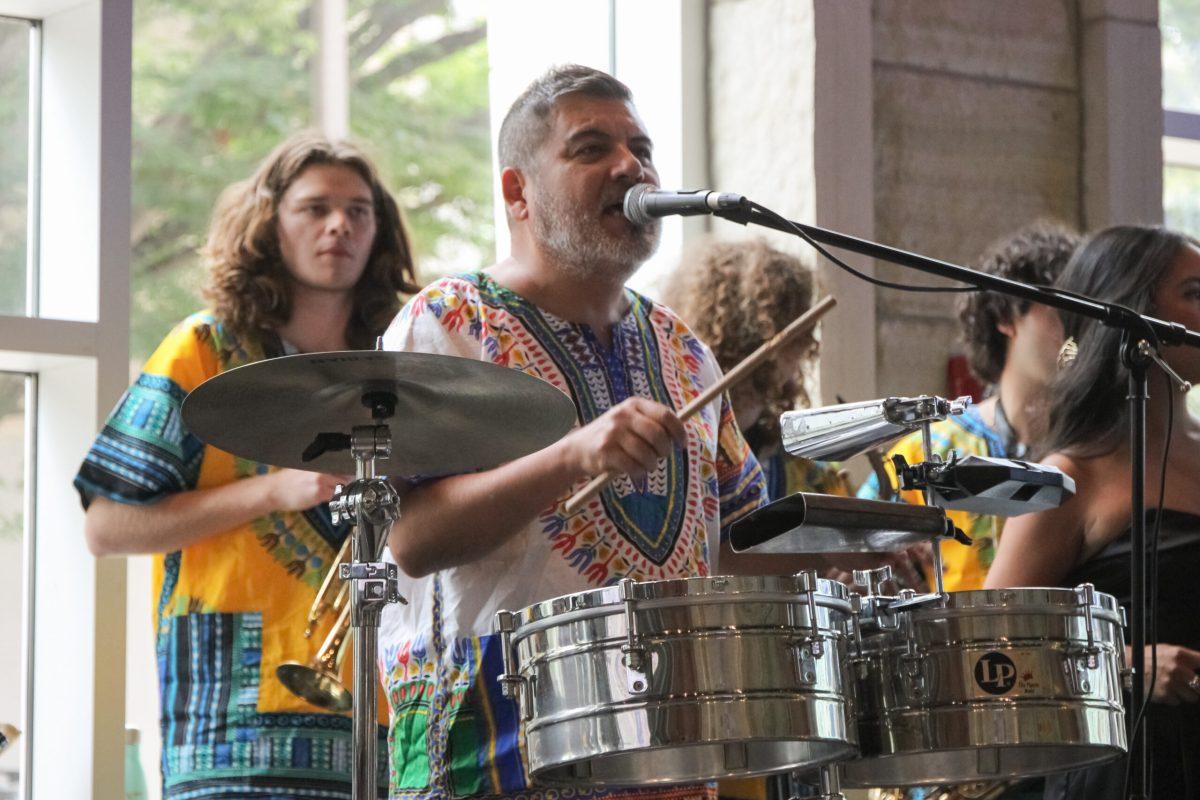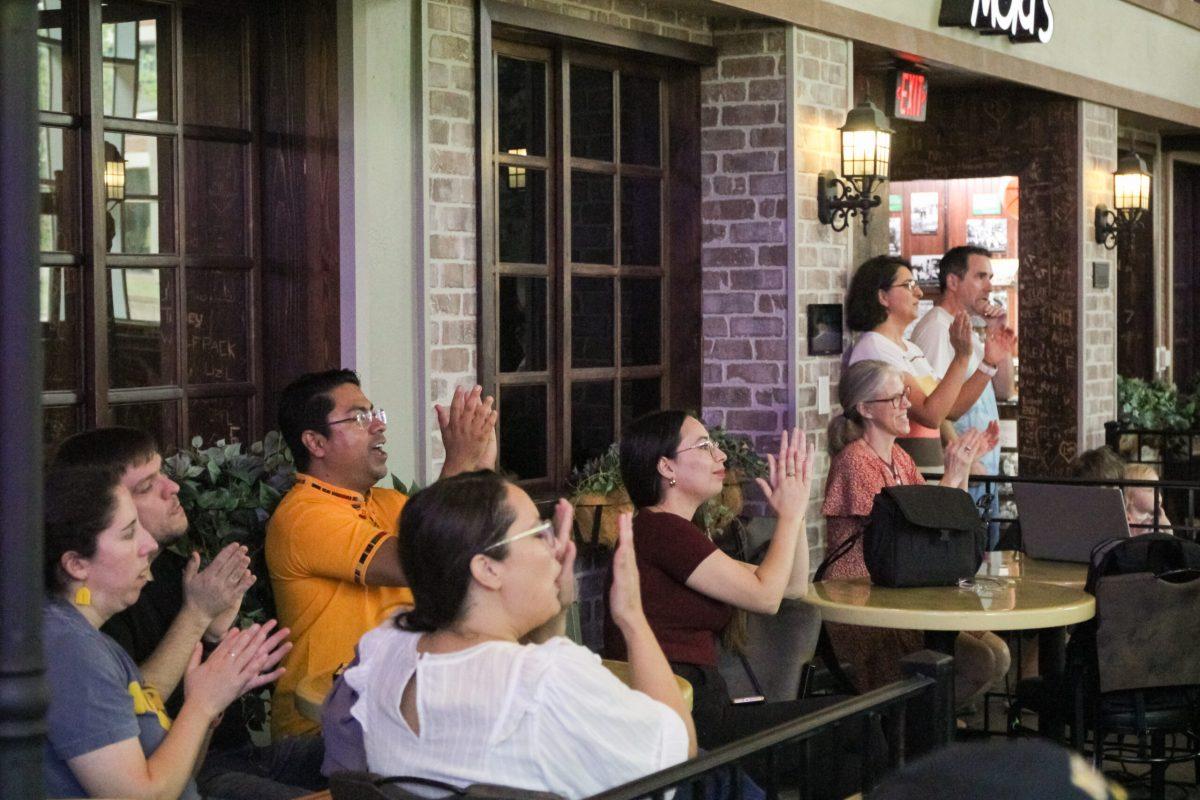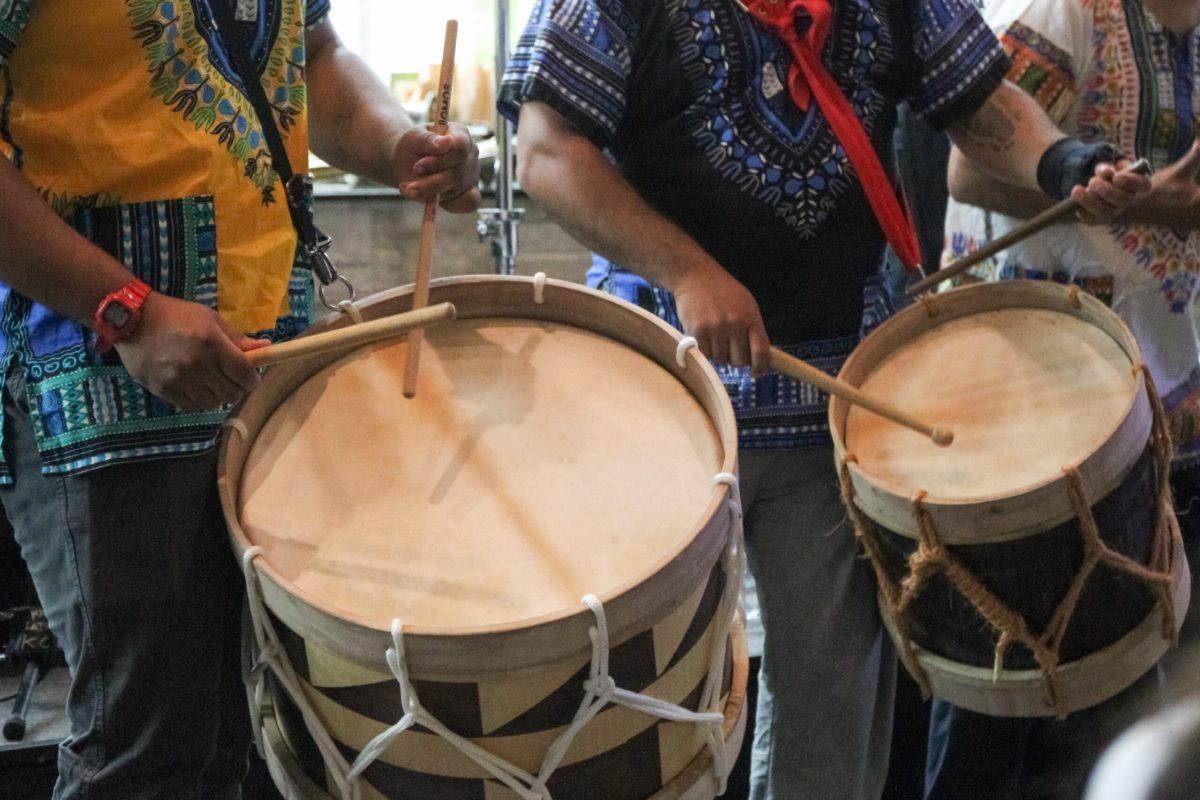Kansas City Latin Jazz Orchestra kicks off MU Cambio Center’s Hispanic/Latine Heritage Month activities with a musical trip to Latin America.
A vibrant symphony of powerful percussion and soulful Latin American melodies resounded out of The Shack at the University of Missouri on Sept. 13. The Kansas City Latin Jazz Orchestra and featured master drummer and craftsman Pitoco De Aira treated the audience to an assortment of Latin American music at the ‘Voyage of the Drum’ concert, which The Cambio Center hosted.
The KCLJO, founded in 2018 by artistic director and musician Pablo Sanhueza and historian and preservationist Cynthia Ammerman, is a performance ensemble and registered non-profit conservatory with the aim of passing on the musical knowledge of Latin jazz, Afro-Caribbean and South American cultural arts to the Kansas City community.
“This music has not been heard at this level in this region . . . the goal of this [KCLJO] is to bring that awareness to our region . . . because that world class level of experience is available here and should be cultivated and respected,” Ammerman said.
 Pablo Sanhueza, musician and co-founder of Kansas City Latin Jazz Orchestra, sings and plays timbales at the ‘Voyage of the Drum Concert’ hosted by the MU Cambio Center on Friday, Sept. 13, 2024 at The Shack in Columbia. The concert featured music from across Central and South America.
Pablo Sanhueza, musician and co-founder of Kansas City Latin Jazz Orchestra, sings and plays timbales at the ‘Voyage of the Drum Concert’ hosted by the MU Cambio Center on Friday, Sept. 13, 2024 at The Shack in Columbia. The concert featured music from across Central and South America.
The rehearsal began with a blast of lively, energetic music. The trumpet and saxophone lilted in jazzy, buoyant melodies. The catchy beats, a trademark of cumbia music from Colombia, created an irresistible groove. Within moments, the audience was clapping, tapping their feet and swaying to the rhythm.
And that was just the soundcheck.
The next destination on the melodic travel itinerary of the concert was merengue from the Dominican Republic. The fast-paced rhythm propelled people up on their feet and into a dancing circle in the center of The Shack. They spun swiftly and bounced joyfully as Sanhueza sang playful call-and-response lyrics that the other musicians echoed.
The seamless rapport between the members of the band and Sanhueza stems from the unique learning system in their organization. The KCLJO utilizes Latin American teaching methods that emphasizes apprenticeship and hands-on learning through teaching.
“We have Pablo as the elder, the apprentice musicians who are learning the specialty of Latin Jazz music and the education component, where everybody comes together and works with even younger students,” Ammerman said. “A lot of that is tied to community and well-being too.”
The KCLJO is dedicated to “the preservation and advancement of Latin Jazz, Afro-Caribbean and South American folk and cultural arts.” This includes not only teaching and performing the art itself but fostering a community of learning.
“For about five years, I’ve been playing in [Sanhueza’s] band, so he’s kind of taken me under his wing — me and a lot of other folks,” trumpet player and apprentice musician Caden Smith said.
 Audience members at the ‘Voyage of the Drum’ concert applaud for the KCLJO at the end of its final performance on Friday, Sept. 13, 2024 at The Shack in Columbia. The audience cheered for an encore after the concert had finished.
Audience members at the ‘Voyage of the Drum’ concert applaud for the KCLJO at the end of its final performance on Friday, Sept. 13, 2024 at The Shack in Columbia. The audience cheered for an encore after the concert had finished.
For this event specifically, the KCLJO honored maracatu, a Brazilian musical tradition from the Northeast of Brazil, commonly played at the annual Carnival festival in Pernambuco, Brazil, alongside featured master drummer Pitoco De Aira.
This music was strikingly different from the rest of their repertoire, consisting only of five percussion instruments and sparse vocals. The alfaia, a percussion instrument handcrafted and played by De Aira, boomed over the other drums like thunder. Each drum played in different cadences until they converged into a unified repeating beat. Altogether, it resulted in a powerful rhythmic symphony.
The music struck a familiar chord with Bruna Dalmas, a Brazilian Ph.D. student.
“I could feel the Carnival, like the beat, and how powerful it was,” Dalmas said. “I almost cried a few times because it felt like home.”
The band spent several months learning the fundamentals of maracatu music, but the whole set came together only four days before the performance, when De Aira arrived in Kansas City, Missouri from Recife, Brazil.
Despite the brief preparation time, the performance was flawless. De Aira subtly directed the other drummers by signaling the changes in flow of the rhythms with slight nods and a smile on his face.
The whole ensemble exuded joy and energy through the intense and festive beats. It was a truly magical experience of being transported to carnival simply through music.
“I don’t know if other people got the same impression, but to me, it was so powerful to see people’s reactions; people getting up and dancing and clapping,” Dalmas said. “It was way better than I was expecting and probably one of my best experiences outside of [the] classroom here at Mizzou.”
Dalmas, a student fellow for Cambio Center, volunteered to be De Aira’s translator for the event. Once his piece came to a close, Dalmas translated De Aira’s message about the music.
“[De Aira] wanted to talk about maracatu, the culture of the music,” Dalmas said. “This music has been present in Brazilian communities for over 200 years. So bringing this culture to Missouri, it’s a pleasure, and he’s happy to be here representing his community.”
 KCLJO musician Brandon Cooper, left, and percussionist and craftsman Pitoco De Aira play alfaias, percussion instruments, during the ‘Voyage of the Drum’ on Friday, Sept. 13, 2024 at The Shack in Columbia. The alfaias are central to maracatu.
KCLJO musician Brandon Cooper, left, and percussionist and craftsman Pitoco De Aira play alfaias, percussion instruments, during the ‘Voyage of the Drum’ on Friday, Sept. 13, 2024 at The Shack in Columbia. The alfaias are central to maracatu.
After De Aira’s performance, there was still time left before the program ended, so Sanhueza and the band improvised the rest of their performance until the end. At that point, it seemed like the event couldn’t get any better.
But it did.
The musicians’ energy was infectious. Every instrument was perfectly orchestrated, creating an upbeat and vibrant synergy. At the same time, it was spontaneous, powerful and ecstatic.
The Shack was alive with the sound of laughter, beats of the drums and cheering. The audience clapped and danced, until the drums swaggered into a dramatic crescendo leading to a tremendous climax.
The audience cheered “Otra, otra, otra!” meaning “another, another, another!”, which Sanhueza humorously declined because the musicians had spent all their energy playing during the concert.
The musicians had not only lifted the audience to their feet with joy and jubilation, but also brought awareness to the vibrant diversity within Latin America through a universal art form: music.
Dalmas believed the music that day had transmitted gaiety and celebration, an integral part of Brazilian culture.
“I think this type of music, it passes this energy of happiness and festivity,” Dalmas said. “I can talk for hours of how happy we are as a society. But to me, there’s nothing really as powerful as music to express that.”
The KCLJO is planning to return to MU next year.
Edited by Molly Levine | [email protected]
Copyedited by Caroline Sweet and Hannah Taylor | [email protected]
Edited by Emilia Hansen | [email protected]
Edited by Emily Skidmore | [email protected]